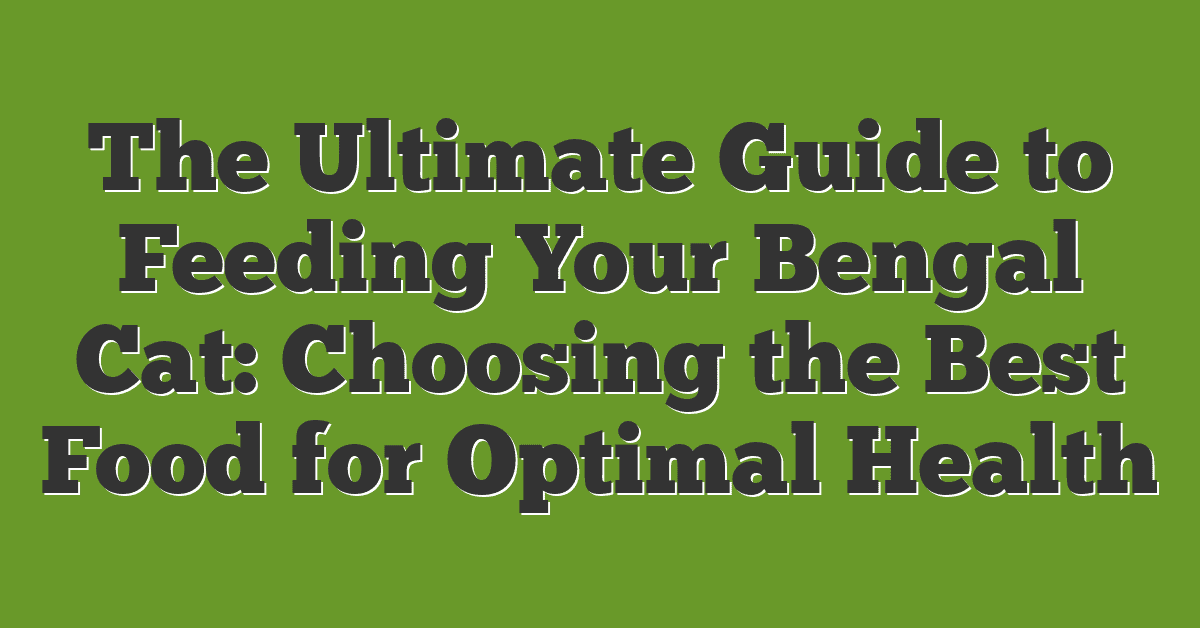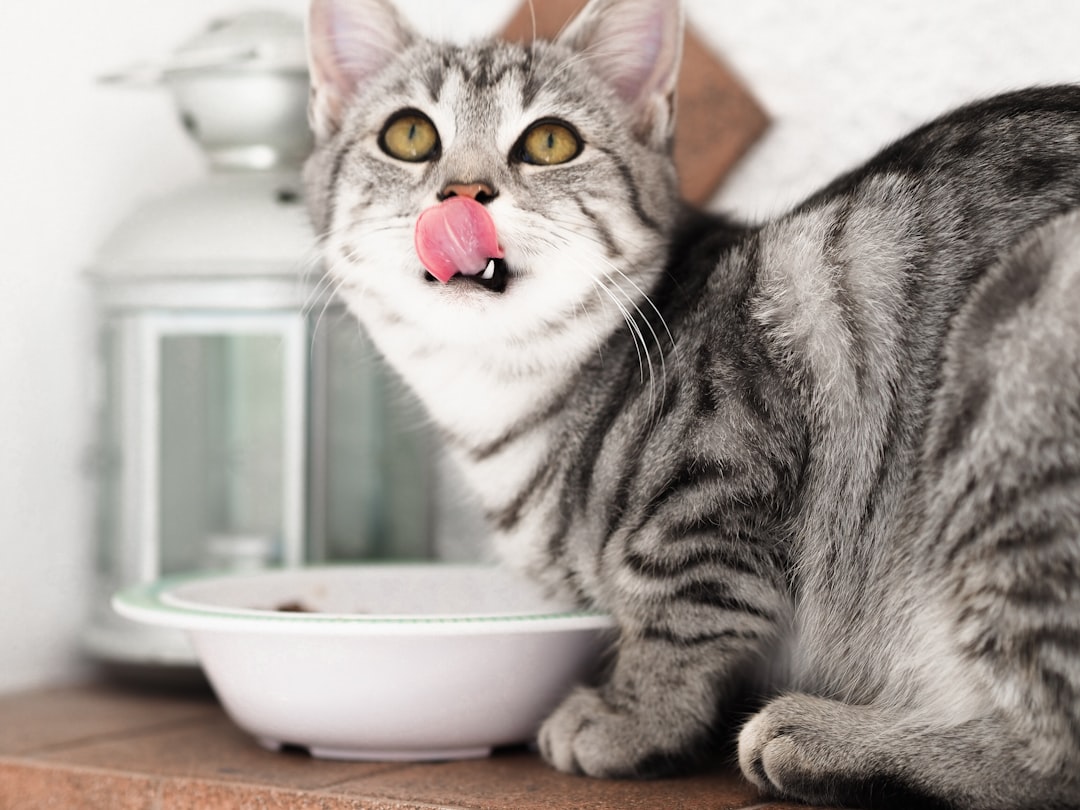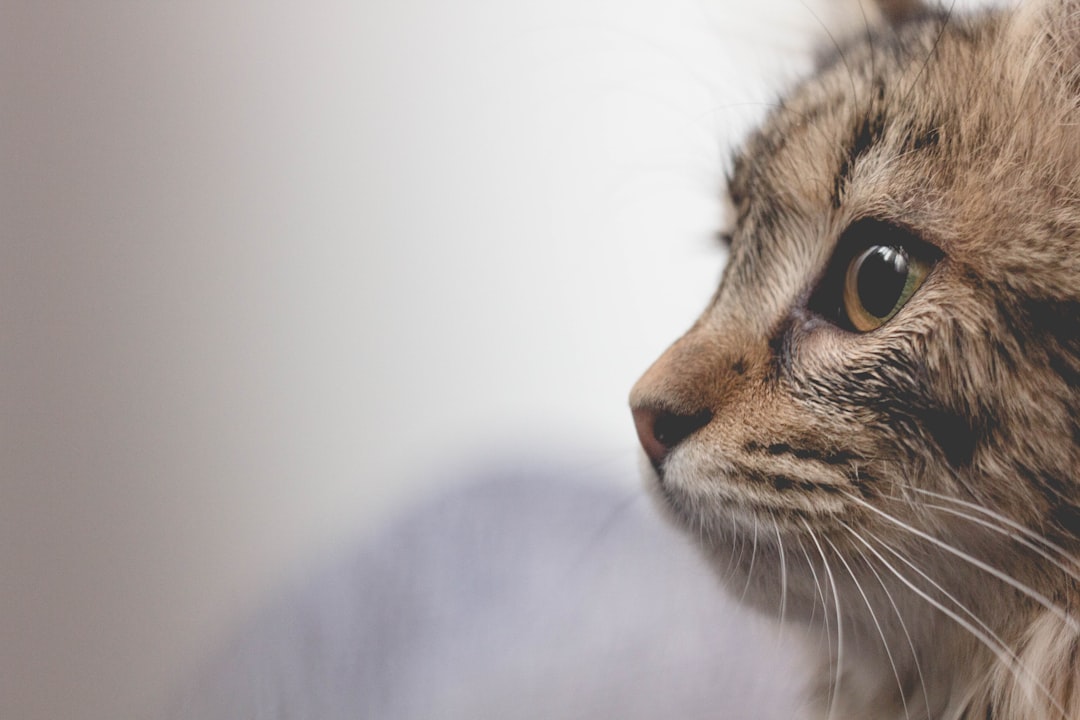Welcome, Bengal cat lovers! As responsible pet owners, we want to ensure our cats are happy and healthy throughout their lives, and one of the most important ways to do this is by feeding them the right food. In this comprehensive guide, we will delve into the best options available when it comes to feeding your Bengal cat, and provide expert tips on creating a healthy meal plan that will keep your feline friend purring with contentment. Read on to discover more!

Understanding Your Bengal Cat’s Nutritional Needs
Bengal cats, like all cats, have specific nutritional needs that must be met in order to ensure optimal health and well-being. Feeding your Bengal cat a balanced diet that includes all of the necessary vitamins, minerals, and nutrients is crucial for maintaining good health throughout their life.
First and foremost, it’s important to remember that all cats, including Bengals, are obligate carnivores. This means that they require a diet that is high in protein and low in carbohydrates. In the wild, cats would consume a diet that consists primarily of meat, so it’s important to provide your Bengal with a similar diet.
When choosing cat food for your Bengal, there are two main types to consider: dry food and wet food. Dry food is convenient and easy to store, while wet food provides additional moisture and can be beneficial for cats with sensitive stomachs. Many veterinarians recommend feeding a combination of both wet and dry food for optimal nutrition.
When selecting a cat food for your Bengal, look for high-quality, natural ingredients that are easy to digest. Consider grain-free or limited ingredient diets if your cat has a sensitive stomach or food allergies. High-protein foods are also a good choice for active Bengal cats who need plenty of energy.
To ensure that your Bengal is getting the right balance of nutrients, it’s important to feed them the appropriate amount of food based on their age, weight, and activity level. It’s also important to provide them with fresh water at all times to keep them hydrated.
When selecting a brand of cat food, look for ones that contain vitamins and minerals to support your Bengal’s immune system, coat health, and overall well-being. Probiotics can also help maintain digestive health and support a healthy gut flora.
In addition to a well-rounded diet, supplements can also be beneficial for Bengal cats. Supplements can include vitamins, minerals, and other nutrients that may be missing from your cat’s diet. Some supplements, like omega-3 fatty acids, can also promote healthy skin and coat.
By understanding the specific nutritional needs of your Bengal cat, you can choose the best food for them to ensure optimal health and well-being. Remember to consult with your veterinarian if you have any questions or concerns about your cat’s diet or nutritional needs.
Key takeaways:
- Bengal cats are obligate carnivores and require a diet that is high in protein and low in carbohydrates.
- Dry food and wet food are both good options, but it’s important to look for high-quality, natural ingredients that are easy to digest.
- Feeding guidelines should be based on your cat’s age, weight, and activity level.
- Look for brands that contain vitamins and minerals to support your Bengal’s overall health and well-being.
- Supplements can also be beneficial, particularly for promoting healthy skin and coat.
Types of Cat Food and Which one is Best for Your Bengal
When it comes to feeding your Bengal cat, choosing the right type of food can make a big difference in their overall health and well-being. There are a few different options to consider, including dry food, wet food, and raw food diets. Each has its own advantages and potential drawbacks, so it’s important to understand the benefits and limitations of each type.
Dry Food:
Dry food is a popular choice for many cat owners, thanks to its convenience and affordable price point. It’s easy to store and comes in a wide variety of flavors and formulas to suit different dietary needs. However, some dry cat foods can be high in carbohydrates and fillers, which may not provide your Bengal with the high protein, low carb diet they need. If you choose a dry food for your Bengal, look for high-quality options that are made with real meat as the first ingredient, and avoid those with high carbohydrate content or artificial additives.
Wet Food:
Wet food is another option to consider, and many Bengal cats enjoy its meaty flavor and texture. Wet food is typically richer in protein and moisture, which can be beneficial for cats with sensitive stomachs or those prone to urinary tract issues. However, it can be more expensive and harder to store than dry food, and some cats may not prefer the texture or scent of wet food. If you choose a wet food for your Bengal, look for varieties that include real meat as the first ingredient and avoid those with added fillers or artificial preservatives.
Raw Food:
Raw food diets have become increasingly popular in recent years, thanks to their potential health benefits for cats. These diets are typically made with uncooked meats, organs, and bones, and are said to mimic the natural diet of wild cats. However, raw food diets can be expensive and time-consuming to prepare, and may not provide all the necessary vitamins, minerals, and nutrients your Bengal needs. Additionally, there is some concern about the possibility of bacterial contamination from raw meats. If you choose a raw food diet for your Bengal, it’s important to work with a veterinarian or animal nutritionist to ensure that the diet is balanced and provides all the necessary nutrients.
Ultimately, the best type of cat food for your Bengal will depend on their individual needs and preferences. Some Bengal cats may do well on a combination of different types of food, while others may thrive on a single type. Just be sure to choose high-quality, protein-rich options, and avoid those with excessive fillers, artificial additives, or questionable ingredients.
Ingredients to Look for and Avoid in Bengal Cat Food
Knowing what ingredients to look for and avoid in your Bengal cat’s food is essential for keeping them healthy and happy. Here are some key ingredients to consider when choosing cat food for your Bengal:
Ingredients to Look for:
- High Protein: Bengal cats are natural hunters and require a diet high in protein. Look for cat foods that have a protein content of at least 30%.
- Limited Ingredients: If your Bengal has a sensitive stomach or food allergies, choose a cat food that has limited ingredients. This will help you narrow down the potential allergens in their diet.
- Vitamins and Minerals: Essential vitamins and minerals are important for your Bengal’s overall health. Look for cat foods that are fortified with vitamins like A, D, E, and important minerals such as phosphorus and calcium.
- Probiotics: Probiotics help support good bacteria in your cat’s digestive system and promote healthy digestion. Look for cat foods that contain probiotics to support your Bengal’s digestive health.
Ingredients to Avoid:
- Grain Fillers: Bengal cats are obligate carnivores, and as such, their digestive systems have evolved to process animal proteins and fats. Fillers like corn and wheat can be difficult for them to digest and may cause stomach issues.
- Artificial Preservatives: Chemical preservatives like BHA, BHT, and ethoxyquin can be harmful to your Bengal’s health. Look for cat foods that use natural preservatives like vitamin C and E.
- By-Products: Avoid cat foods that contain by-products as they can be of low quality and may not provide the nutrients that your Bengal needs.
- Added Sugars: Bengal cats do not need added sugars in their diet. Sugars can lead to health problems like obesity and dental issues.
By choosing cat foods with high-quality ingredients, you can support your Bengal’s overall health and wellbeing. When in doubt, consult with your veterinarian for their recommendations on choosing the best food for your Bengal.
Feeding Guidelines for Bengal Cats
Feeding your Bengal cat can be a bit tricky. Unlike their wild ancestors, domestic cats have evolved to have different nutritional needs. In the wild, cats are natural hunters and eat an array of different prey to get all their necessary nutrients. Thus, it’s essential to ensure that their diet mimics their natural feeding habits. In this section, we’ll outline some feeding guidelines that will ensure that your Bengal cat stays healthy and happy.
Firstly, it’s essential to feed your cat based on their age and weight. Kittens require more food than mature cats, while overweight or senior cats need fewer calories to maintain their optimal weight. Additionally, ensure that you adjust your cat’s diet accordingly if they suffer from any health conditions that require special diets. For example, cats with diabetes might need a low carb diet to maintain their blood sugar levels.
Next, split your cat’s daily meals into small portions and feed them several times a day. Feeding your cat several meals a day will mimic their natural feeding patterns and prevent overeating. Cats have very sensitive tummies that can’t handle sudden changes in their diets. Therefore, if you need to introduce a new diet, do it gradually. Slowly introduce new types of food over a few weeks to avoid upsetting your cat’s digestion.
When it comes to the type of food, there are different options available. Dry food is a popular option, as it’s convenient and lasts longer than wet food. However, it’s essential to note that dry food has lower moisture content, which might not be suitable for cats that don’t drink enough water. Wet food, on the other hand, is high in moisture content and helps cats stay hydrated. It’s also a great option for cats with dental issues as it’s softer and easy to chew.
Finally, consider incorporating supplements into your cat’s diet. Supplements such as probiotics and omega-3 fatty acids can help improve your cat’s immunity, coat health, and digestive health. However, always consult with your veterinarian before introducing any new supplements to your cat’s diet.
Choosing the right diet for your Bengal cat can be a bit overwhelming, but by following these feeding guidelines, you can ensure that your cat receives optimal nutrition and stays healthy for years to come.
Choosing the Right Brand of Cat Food for Your Bengal
Choosing the Right Brand of Cat Food for Your Bengal
Now that we have discussed the nutritional needs of Bengal cats, types of cat food, and important ingredients to look for, it’s time to discuss how to choose the best brand of cat food for your Bengal. With so many brands and options available, it can be overwhelming to decide which one to choose.
Here are some factors to keep in mind when choosing cat food for your Bengal:
Brand Reputation: Look for brands that have a good reputation in the market and have been around for a while. A good brand will have a track record of producing quality and safe pet food.
Quality of Ingredients: Ingredients used in cat food matter, and the quality of these ingredients will help determine the health benefits of the food. Look for brands that use high-quality ingredients, and avoid those that contain low-quality fillers, artificial colors, flavors, and preservatives.
Nutritional Profile: Choose cat food that is designed to meet the specific nutritional needs of Bengal cats. Look for brands that offer high protein content, limited ingredients for sensitive stomachs, and low carbohydrate content.
Age-specific: Bengal cats have different nutritional needs based on their age. Look for brands that offer kitten food, adult food, and senior food.
Sensitive stomach: Bengal cats can also have food allergies, so it is imperative to choose brands that offer hypoallergenic and grain-free options.
Budget: High-quality cat food can be expensive, and the food’s price is an important consideration. Find a brand that fits your budget and meets all of your Bengal cat’s nutritional needs.
Recommended Brands for Bengal Cats:
Blue Buffalo: Offers high-quality, natural ingredients with no by-products, wheat, or soy. The brand also provides age-specific formulas and weight management options.
Orijen: Offers high-quality, grain-free, and biologically appropriate cat food made with fresh, whole ingredients.
Merrick: Offers limited ingredient and grain-free options, with all-natural ingredients, and high protein content to meet the needs of Bengal cats.
Nutro: Offers natural dry and wet cat food options, with high protein content, aged-based formulas, and sensitive digestion formulas.
In conclusion, when choosing the right brand of cat food for your Bengal, always keep in mind the nutritional needs, quality of ingredients, brand reputation, and budget. By doing so, you can ensure your Bengal cat enjoys a healthy, balanced diet that provides all the necessary nutrients for optimal health.
Supplements for Optimal Bengal Cat Health
Bengal cats are known to be active, playful, and full of energy. As a result, they require essential vitamins, minerals, and other nutrients to maintain good health and prevent any deficiencies. While a well-balanced diet can provide most of the essential nutrients, sometimes your Bengal cat may need additional supplements to optimize their health.
Here are some of the supplements that you can add to your Bengal cat’s diet to ensure they are getting all the nutrients they need:
Probiotics
Probiotics are live bacteria that are beneficial to your Bengal cat’s digestive system. They can help improve digestive health and support immunity by promoting the growth of healthy gut bacteria. Probiotics can also be beneficial for cats with sensitive stomachs, diarrhea, or constipation.Omega-3 and Omega-6 Fatty Acids
Both omega-3 and omega-6 fatty acids are essential for maintaining a healthy coat and skin in Bengal cats. Omega-3 fatty acids have anti-inflammatory properties that can help reduce inflammation associated with skin allergies or joint pain. On the other hand, omega-6 fatty acids can help improve skin barrier function, keeping your cat’s skin moisturized and healthy.Multivitamins
Multivitamins are an easy and convenient way to ensure that your Bengal cat’s diet is not lacking any essential vitamins and minerals. They can be especially beneficial for senior cats or those with a limited ingredient diet. Some multivitamins even come in flavors that cats love, making them easier to administer.Taurine
Taurine is an amino acid that is vital for the optimal health of Bengal cats. It plays a crucial role in maintaining cardiovascular health, eye health, and immune function. Bengal cats are unable to synthesize taurine on their own, making it essential to supplement their diet with this amino acid.Glucosamine and Chondroitin
Both glucosamine and chondroitin can help improve joint health and mobility in Bengal cats. These supplements work together to help repair damage to the cartilage and reduce inflammation in the joints. They are especially beneficial for senior cats or those with arthritis.
When it comes to supplements for your Bengal cat, it’s crucial to consult with your veterinarian before adding anything to their diet. Your veterinarian can recommend the appropriate supplements for your cat’s specific needs and help monitor their health to ensure they’re thriving.


















